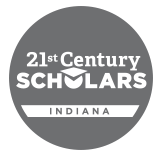Advance CTE will be writing a series of blog posts profiling the policies and practices of free college in the United States. This post will explore one example of a free college program. Check out last week’s blog on the history of free college, and look for future blogs on the challenges and future of free college.
 The idea of free college has gained traction in a number of states. Indiana has been at the forefront of this movement, and has had some form of free college for the past 30 years. Currently, Indiana’s 21st Century Scholars program allows participants up to four years of free enrollment at a two or four-year institution. This covers the cost of tuition and any additional fees. Indiana is unique in including four-year colleges in this program, since fewer than half of states with free college initiatives include four-year institutions in their policies.
The idea of free college has gained traction in a number of states. Indiana has been at the forefront of this movement, and has had some form of free college for the past 30 years. Currently, Indiana’s 21st Century Scholars program allows participants up to four years of free enrollment at a two or four-year institution. This covers the cost of tuition and any additional fees. Indiana is unique in including four-year colleges in this program, since fewer than half of states with free college initiatives include four-year institutions in their policies.
This program covers tuition on a “first dollar” basis, meaning that students remain eligible for other forms of aid to go toward non-tuition expenses. Any additional aid learners might receive from the state is not impacted by grants received to cover non-tuition charges.
Learners can become involved in this program as early as seventh grade. Students who qualify for free or reduced lunch in seventh or eighth grade are eligible to apply to be part of 21st Century Scholars. Below are 12 requirements that participating students must meet throughout high school in order to qualify:
- 9th grade:
- Create a graduation plan (to be updated annually);
- Participate in an extracurricular or service activity; and
- Watch “Paying for College 101”
- 10th grade:
- Take a career interests assessment;
- Get workplace experience; and
- Estimate the costs of college
- 11th grade:
- Visit a college campus;
- Take a college entrance exam (ACT/SAT); and
- Search for scholarships
- 12th grade:
- Submit college application;
- Watch “College Success 101;” and
- File FAFSA
In 2017, the program granted over $160 million in financial aid. As of the fall of 2018, there were about 80,000 program participants throughout middle and high school and 20,000 in college. This program has bipartisan support in the state.
Meredith Hills, Policy Associate

